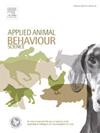Curcuma and Scutellaria baicalensis extracts reduced thermoregulatory behavior in chickens subjected to moderate heat stress
IF 2.2
2区 农林科学
Q1 AGRICULTURE, DAIRY & ANIMAL SCIENCE
引用次数: 0
Abstract
Using phytogenic additives represents a new trend in the poultry feed industry because of purported beneficial impacts. There is limited information about the effects on chicken behavior, but based on new studies, some plant-based active compounds influence animal cognitive function. Therefore, the primary objective of this experiment was to investigate the impact of a feed additive consisting of a mixture of Curcuma and Scutellaria baicalensis on behaviors associated with exposure to heat stress in broiler chickens. Chickens before 21 days of age were kept in 12 littered floor boxes according to guidelines for Cobb 500 hybrid. The Cobb 500 chickens of both sexes were fed identical diets until they reached 21 days of age. From this point onward, the experimental group received in the diet a 0.1 % supplement containing Curcuma and Scutellaria baicalensis extracts. The control group received a feed mixture without phytogenic additives. Both groups had six replicates, and each group comprised 75 chickens. The pens of experimental and control group were randomly selected. The experimental period spanned from 28 to 35 days of age, during which the chickens were subjected to mild constant heat stress (28°C). Ethological observations were conducted at 31, 32, and 33 days of age, divided into three observation periods at the beginning, middle, and end of the daylight period (18 h) using the visual scan sampling method. After the experimental period at 35 days of age, chickens from both groups exhibited nearly identical live body weights and daily feed intake. However, the experimental group demonstrated significantly higher daily weight gain (P < 0.05). Thermoregulatory behaviors such as panting and wing spreading were suppressed (P < 0.05) in the experimental group, while there was a simultaneous increase in the number of chickens that were feeding (P < 0.05). Similarly, age significantly influenced behavioral patterns (P < 0.05), whereas time of the day only affected the number of chickens engaged in feeding (P < 0.05). In conclusion, the feed mixture enriched with Curcuma and Scutellaria baicalensis extracts exhibited performance-enhancing and behavior-changing effects, providing significant insights into the potential of this feed additive in improving performance and reducing thermoregulatory behavior manifestations within a flock under heat-stress conditions, thereby informing the poultry feed industry of a promising new development.
求助全文
约1分钟内获得全文
求助全文
来源期刊

Applied Animal Behaviour Science
农林科学-行为科学
CiteScore
4.40
自引率
21.70%
发文量
191
审稿时长
18.1 weeks
期刊介绍:
This journal publishes relevant information on the behaviour of domesticated and utilized animals.
Topics covered include:
-Behaviour of farm, zoo and laboratory animals in relation to animal management and welfare
-Behaviour of companion animals in relation to behavioural problems, for example, in relation to the training of dogs for different purposes, in relation to behavioural problems
-Studies of the behaviour of wild animals when these studies are relevant from an applied perspective, for example in relation to wildlife management, pest management or nature conservation
-Methodological studies within relevant fields
The principal subjects are farm, companion and laboratory animals, including, of course, poultry. The journal also deals with the following animal subjects:
-Those involved in any farming system, e.g. deer, rabbits and fur-bearing animals
-Those in ANY form of confinement, e.g. zoos, safari parks and other forms of display
-Feral animals, and any animal species which impinge on farming operations, e.g. as causes of loss or damage
-Species used for hunting, recreation etc. may also be considered as acceptable subjects in some instances
-Laboratory animals, if the material relates to their behavioural requirements
 求助内容:
求助内容: 应助结果提醒方式:
应助结果提醒方式:


